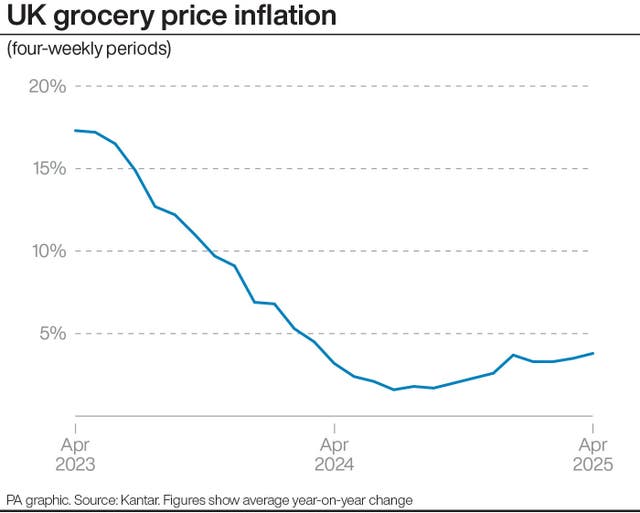Grocery price inflation jumps to highest in over a year, figures show
Prices were largely driven higher by a 17.4% rise in chocolate confectionery prices in the four weeks to April 20.

Grocery price inflation has surged to its highest level for over a year as chocolate prices soared by nearly a fifth, but this failed to dent demand for Easter eggs, according to new figures.
The latest data from retail analysts Kantar showed that grocery inflation rose to 3.8% in the four weeks to April 20, up from 3.5% in the previous month and the highest since the four weeks to March 17 last year.
It was largely driven by a 17.4% jump in chocolate confectionery prices, while coffee and butters and spreads also saw big increases.

But the figures revealed that rising prices did not stop shoppers splashing out over the Easter holidays, with spending on Easter eggs up by 11% year-on-year over the four weeks to Easter.
Some of this rise was driven by the higher prices but the number sold through supermarket tills also rose, up 0.4% on last year, signalling strong demand.
Sales overall across UK supermarkets rose by 6.5% in the four weeks to April 20, the figures showed.
Supermarket customers looked to discounts and loyalty card deals to help cut the costs of their food shop, with spending on promotions reaching 29.7% – its highest level so far this year, Kantar said.
Fraser McKevitt, head of retail and consumer insight at Kantar, said: “The grocers have been sharpening their pricing strategies to stay competitive in the fight for footfall.
“They’ve invested in price cuts which were the main driver of promotional growth.
“Often linked to loyalty cards, spending on these deals grew by £347 million.
“At Tesco and Sainsbury’s, nearly 20% of items sold are on a price match, and they end up in almost two thirds of baskets.”
He said that there was also evidence of shoppers trading up for their Easter shop, with premium own label sales up 23.2% in the past four weeks.
“Ultimately, retailers need to be seen to be offering great value but it’s a fine tightrope to walk, particularly as they manage their own business costs,” he added.
The latest supermarket share price data showed Ocado was the fastest-growing retailer once again in the 12 weeks to April 20 – a title it has held continuously for nearly a year now.
The online grocer’s sales grew by 11.8% year-on-year in the quarter, while it increased its market share to 1.9% from 1.8% a year ago.
German discounters Lidl and Aldi continued to make solid gains, with sales growth of 10.1% and 5.9% and market shares of 8% and 11% respectively.
Of the bigger chains, Tesco had the highest sales growth of 6%, nudging up its share to 27.8%, while sales at Sainsbury’s grew by 4.4%, taking its share to 15.3%.
Under-pressure rival Asda remained the worst performer, with sales down 3.8% and its share falling to 12.3% from 13.3% a year earlier.





